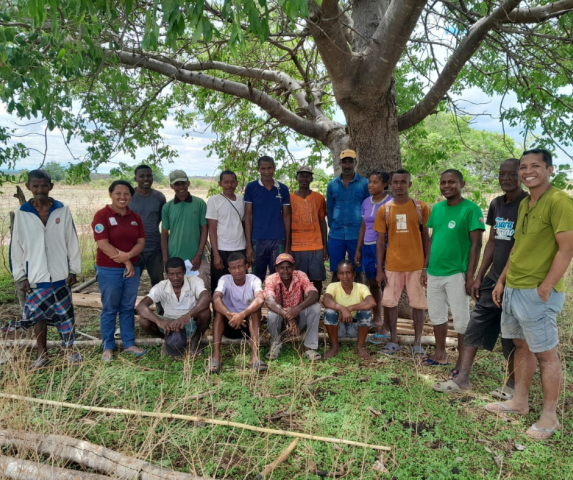
Deforestation and increasing pressure on natural resources are threatening Madagascar's ecosystems, particularly around Lake Tseny. The training of local communities around Lake Tseny was made possible through the collaboration between Madagasikara Voakajy and the Tsimoka Association, focusing on the implementation of the dynamic agroforestry technique.
This initiative was introduced using the Farmer Field School (FFS) approach, designed to train local farmers in adopting agricultural practices adapted to climate change.
As part of this effort, 25 agricultural innovators were selected to spread these techniques within their communities. These innovators, chosen based on their motivation and skills, receive seeds, technical support, and intensive training. They will play a key role in driving agricultural transformation around Lake Tseny.
The farmer field school approach at the core of learning
One of the project's major strengths is its use of the Farmer Field School (FFS) approach, a participatory learning method that places farmers at the center of the process. Over two days, participants attended theoretical sessions on the principles of dynamic agroforestry, followed by a half-day of hands-on practice in the field, where they applied the concepts learned.
The FFS allows farmers to share their knowledge and directly experiment with innovative techniques on their plots. This promotes a better understanding of climate-adapted agricultural methods and local specifics while creating a space for exchange and collaboration between farmers and project technicians. Each plot, following FFS criteria, must host at least 12 different seed species, ensuring agricultural biodiversity that protects the soil and improves yields.
Dynamic agroforestry: a solution with multiple benefits
Dynamic agroforestry offers numerous benefits to local communities. In addition to generating sustainable income, it helps combat malnutrition by diversifying agricultural production. Moreover, this method contributes to climate change adaptation, providing increased resilience to climate variability.
The distribution of seeds to agricultural innovators marks a new phase in this project, where every action matters for the protection of biodiversity and the securing of natural resources around Lake Tseny. By partnering with local stakeholders, Madagasikara Voakajy ensures that the practices implemented meet the needs of communities while respecting the region's fragile ecosystems.
The project, funded by the Critical Ecosystem Partnership Fund (CEPF) around Lake Tseny, is fully aligned with Madagasikara Voakajy’s mission to reconcile biodiversity conservation and the well-being of local communities. By training farmers in sustainable agricultural practices and directly involving them in natural resource management, we are laying the groundwork for a harmonious development between humans and their environment.




